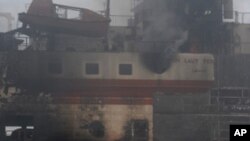A train crash and ferry fire in Indonesia killed at least 14 people in separate incidents that left hundreds injured. The two accidents raised new questions about the state of the country’s transportation infrastructure.
Two passenger trains collided head-on 270 kilometers from Jakarta in the early morning hours on Friday. About 30 minutes later, a ferry burst into flames off the west coast of Java, forcing scores to jump overboard into the sea.
Rescue boats were sent to carry more than 400 passengers to safety. Television footage showed thick plumes of smoke billowing from the ferry. The Ministry of Transportation says it is still investigating how the fire started.
Hundreds were injured in the two accidents.
Transportation Ministry spokesman Bambang Ervan says a technical problem caused the collision of the trains traveling between the cities of Bandung and Surabaya.
Indonesia’s railway system is old and poorly maintained. Transportation experts say disagreements between the government, which is responsible for railway repairs, and the company that operates the trains have led to serious lapses in safety.
"The first issue is the safety-scrutiny procedures that have not been put in place properly, especially on the sea transport sectors," said Danang Parikesit, the head of the non-governmental Indonesia Transportation Society. "On the issue of the railway crash, this again also indicated that there are mis-coordinations as well as the lack of investment in technology, especially communication technology."
Danang says Indonesia’s public transportation is weighed down by a growing number of passengers.
He adds the country's infrastructure is not capable of meeting the increased demand, and early warning systems are limited.
Government critics say marine transportation has been ignored.
"There has been very little effort to modernize the sea transport as compared for example, with air transport," says Heru Sutomo, chairman of the Center for Transportation and Logistic Studies at Gadjah Mada University in Yogyakarta.
Indonesia is made up of more than 17,000 islands, making it heavily dependent on sea transportation. But both rail and ferry services have poor safety records.
A high-speed rail collision last October that killed 36 people sparked an investigation that led to the suspension of one of the train’s machinists. And in January 2009, about 330 people died when an overloaded ferry sank off the coast of Sulawesi.
The airline industry had similar safety issues several years ago, some so serious that many countries would not allow flights by Indonesian aircraft. However, many of the problems have been addressed, and Indonesian airlines are flying to more countries.
This year the Ministry of Transportation allocated $445 million to the state railway system for track improvements, maintenance and new cars. As part of efforts to overhaul the country’s transportation system, the ministry has set a goal of reducing the number of fatalities in 2014 by 50 percent from 2004.
Also Friday, several airlines diverted or cancelled flights to the island of Bali to avoid clouds of ash being released by the Mount Bromo volcano on Java. The volcano has been rumbling for several days, but there have been no deaths or injuries.
Scores Injured in Indonesia Train, Ferry Accidents








